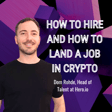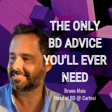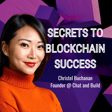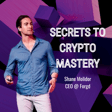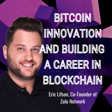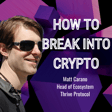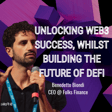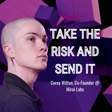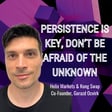Become a Creator today!Start creating today - Share your story with the world!
Start for free
00:00:00
00:00:01

Cracking the Code of Crypto Marketing with Aubrey Terrazas
What do a sommelier, fine dining, and Web3 marketing have in common? More than you’d think. In this episode, Aubrey Terrazas shares how she went from wine cellars to crypto communities and the transferable skills that made it all possible.
We dive into the realities of Web3 marketing, from building brand narratives and leveraging KOLs to breaking into the space, scaling teams, and making yourself indispensable in a fast-moving industry. Packed with sharp insights and candid advice, this conversation is a must-listen for anyone curious about carving out a career in crypto marketing.
Transcript
Introduction to Aubrey Terrazes and Rarible
00:00:00
Speaker
Aubrey, welcome to the show. How are you? I'm good. And you? Yeah, I'm good. Thank you. I'm good. Aubrey, for people who don't know who you are, could you give us a bit an intro, please?
00:00:13
Speaker
Sure. So I'm Aubrey Terrazes. Currently, I'm the VP of Marketing at Rarible. It's an NFT digital asset company and best known for the marketplace. But we also have a B2B suite that helps with NFT infrastructure as well.
Transition from Sommelier to Marketing
00:00:31
Speaker
I've been marketing for 10 years and in Web3 for about four and then bit of fintech before that. ah But my background was actually a sommelier. So i was in fine dining prior to everything.
00:00:46
Speaker
And then in late 2015, started an agency that was focused more on wine spirits. um And then eventually we took over to some other types of startups, included tech.
00:01:00
Speaker
but a lot of food and Bev and lifestyle brands.
Crypto Journey and Skills from Hospitality
00:01:04
Speaker
And we grew really quickly. We did well. It was based in San Francisco and it was a well-targeted niche.
00:01:11
Speaker
Moved to Europe from California in 2019, just before COVID. And so while I was at home and there was a Bitcoin halving, got interested in crypto and after working in wine for a number of years, got a bit fed up with how slow it was, so decided to go to of the complete opposite side of that and looked for a crypto job.
00:01:36
Speaker
um And yeah, I've been working in the space ever since. Sounds cool. Sounds cool. And could you, I mean, just to start ah there, I mean, that's quite the switch to go from being a sommelier into tech.
00:01:51
Speaker
um Have you noticed my many transferable skills from that that you were able to put across? Yeah, you know, it's funny. um I, having my my background and obviously knowing a lot of food and beverage people and not just food and beverage people, but people that are really at the top of their game, you know master sommeliers or world renowned chefs.
00:02:17
Speaker
um i actually think that restaurant employees and service employees are greatly under looked because people sort of see it as a career or job that gets you through, through uni or whatever. um but actually, uh, there's a lot of things. One, especially for front of house, you're certainly learning sales.
00:02:38
Speaker
Um, I think building rapport very quickly ah something that comes with that role. Also, I just adapting. I think that's one of the biggest transferable skills is that you don't know what you're walking into. Every service was different and you always had to adapt. It's like, okay, great. We ran out of something, something breaks.
00:03:00
Speaker
There's a crazy guest. You always just have to adapt and the show must go on as they say. um so I think that's a big one. Of course, collaboration, working on teams, management and marketing was the skill that I obviously transferred more literally um as a beverage director and general manager.
00:03:22
Speaker
You know, we didn't, for restaurants, except in the case of maybe larger restaurant groups, there's not really, you know, a PR person or a marketing person in-house. So it's usually the staff that are doing the social media and doing some guerrilla marketing and out there representing the brand.
00:03:39
Speaker
And yet somehow these brands do succeed. You know, we all know about these Michelin starred restaurants, even though maybe it's a team of 10, 15 people. So how does that happen?
Web3 Marketing: Community and Culture
00:03:50
Speaker
It's because they're inviting influencers to come and post about them. They're reaching out to journalists, they're doing the social media, they're going out to these wine tastings or whatever, you know, other, other situation that might be related to the specific position.
00:04:09
Speaker
And they're talking about the brand and then those people who are always interacting with the target customer, other sommeliers, other servers, other chefs are then also saying, oh, like, have you checked out this restaurant that's in the city or maybe in ah another city that a guest might be visiting?
00:04:27
Speaker
Yeah, for sure. No, no. Yeah. I can see that. I can see that. So you went from, uh, sommelier to, uh, you said their brand director. I, well, I started an agency. I co-founded a marketing agency. It at first was, uh, social media.
00:04:44
Speaker
Um, but then I took it in the vision of being a greater marketing agency. Um, we had picked up quite a bit of skills in particular. We had a um, major client where I was the brand director for an AI wine startup called Palette Club.
00:05:00
Speaker
And um there it was, i you know, i was thrown into the trenches and again, adapted really quickly, studied a lot, took courses and picked up many other skill sets um related to digital and digital marketing and communications.
00:05:16
Speaker
then we expanded and um we had brands like Wines California, Wines Saint Million, major Napa brands like Costa Brown, or they're in Sonoma, but you get it.
00:05:27
Speaker
on And we would sometimes just be doing social media, but oftentimes we'd help with a brand strategy, content writing, event production, you name it. Okay.
00:05:40
Speaker
That makes sense. Cause I was going to ask if you followed the traditional route of ah marketing exec, marketing manager, head of marketing, but that sounds like you just went thrown at the deep end having to look at sorts of different stuff at once.
00:05:52
Speaker
So, um, yeah, that's right. I think it helps though that I had that, that management experience too. Um, so like I was already able to, to manage a team and, um, you know, with any,
00:06:05
Speaker
startup that I worked for, i had the opportunity to to build a marketing team. And so that was you know another skill that sort of transferred over.
00:06:17
Speaker
Nice. And now working in the crazy world of Web3. Yeah. ah You've obviously worked across a number of different industries there, as you said, and in that marketing capacity. you This might be quite a difficult question.
00:06:29
Speaker
Could you give us a crash course on Web3 marketing and maybe how it differs or how it's similar to other industries? And could you talk us through it?
Differences in Traditional vs Web3 Marketing
00:06:38
Speaker
Yeah, you know, you just have to post on Twitter.
00:06:41
Speaker
No, I'm kidding. I think that's the perception sometimes, though, is that ah you just you just put something out. on It's like you put your logo and your partner's logo and bam, crypto marketing. That's it.
00:06:53
Speaker
Done. No, I think that i obviously there are some things that are applicable. um And actually, I think a lot of the traditional marketing practices are undervalued i'm because people do just think that if you know about DGENs or whatever, then that's all you need to know.
00:07:17
Speaker
But I think that most important, it's right now with crypto, again, there are all sorts of projects that are just getting started. And there's a lot of speculation about the whole industry.
00:07:29
Speaker
so So much of it is, and think, narrative and storytelling. It's very important that someone starts with their brand. And if you jump ahead and start posting, there's going to be some inconsistencies.
00:07:42
Speaker
But people, as much as people might be looking at candlesticks on our chart, so much of it really is emotional. And so I think it's very important that you develop your cultural identity early on and you're very consistent, borderline militant about it.
00:07:58
Speaker
um And then outside of that, I do think that what is very different is this community aspect. um And that's just what I alluded to in the first step is that, you know, your your cultural identity and your narrative and understanding your offering is is key.
00:08:16
Speaker
But then what's a little bit different is that um I think in more traditional marketing, your user acquisition strategy might be a a little bit different. Whereas here, people where people hang out is you know crypto, Twitter, Discord, Spaces.
00:08:36
Speaker
Um, so understanding all of those tools and also the language and dialogue, basically understanding how to talk to your audience. But then there's this added layer where obviously you want to, maybe ah if you ah have a B2C product and you're building a community, you want to speak with memes and humor and something that might appeal to that audience, but you still want a level of polish as well. If maybe you have some institutional,
00:09:04
Speaker
um partners you're trying to pull in or some funding. And so striking that balance and knowing how to deploy your brand voice on each channel and how that might look different in a white paper versus a Discord chat versus your website i is very important.
Community Engagement in Web3
00:09:25
Speaker
Um, and I also think that if a brand doesn't have a community person, then there needs to at least be one face of the brand that's out there because it is such a community oriented industry.
00:09:39
Speaker
And we're really, you know, it people use the word echo chamber a lot here because there you do find that it's, ah it's still very quite niche. And so, uh, you're sort of speaking to the same people.
00:09:54
Speaker
um which is great in one hand because I think you can build your community through those partner channels, but you really need to have someone that's willing to go out there and hop on other podcasts, hop on other spaces um and respond to the community as well because people i think really or craving, you know, like a voice behind behind the company.
00:10:19
Speaker
Should that be the founder? doesn't have to be, no. I mean, as I said, there a lot of times it's a community manager, community lead that might be representing even at speaking conferences, like going to Defcon NFT Paris and being the one that's on panels.
00:10:37
Speaker
It can be the founder, but, um you know, having the vision of the brand doesn't always equate to being the person that that is natural with talking to this audience.
00:10:50
Speaker
It doesn't have to be a community person either. could be ecosystem manager, marketing manager. um It could be head of engineering. I just think that you know there needs to be someone that is is representing the brand out there.
00:11:06
Speaker
and I suppose it depends on your audience as well, right? like If you're a B2B project and your um tool is used by tons of developers, your head of engineering is probably a good person to put in front of.
00:11:17
Speaker
Yeah, or a DevRel. Yeah, DevRel. um Yeah, because I hear the phrase founder-led marketing a lot, and I'm not a marketer. um And I hear that phrase ah push around Web3 quite bit.
00:11:29
Speaker
So yeah, just curious. Yeah, it's curious to hear say it doesn't necessarily have to be the founder, but just someone charismatic, I suppose, who can tell the right story, as you said. Yeah, that's right. um So what else well else do you think people need to, or projects need to have in place?
00:11:45
Speaker
So you said that you need a face so the um for the actual community. You need ah to really work out your brand story and and um the narrative that you're going to talk about. Anything else that you think projects really need to have in place? Could be the team, could be and agencies, could be 12 months vision of the marketing campaigns we're going to run.
00:12:08
Speaker
ah You know, it's interesting. um So if we're really talking about marketing, obviously, I said, you need to start with your narrative, you need to build a culture, you need that person representing you. And that's really just related to building your community. You need community, obviously, need culture.
00:12:24
Speaker
ah The other thing that I think is sort of a paradox with Web3 marketing is that so often with crypto, you need to have this sort of grit and trust. you know They're always like, you know don't don't sell too early.
00:12:42
Speaker
um Look at the fear greed index. when When people are greedy, that's the time for you to play it safe. But it's it's funny because people are so inconsistent with their marketing, though they don't have the patience to see a strategy deploy.
00:13:01
Speaker
and A lot of times these levers can truly bring in a lot of revenue, but they take a bit of time to set up. And you also need to test. And, you know, if you do one spaces with 12 listeners and then never do spaces again, that's not really ah good indication of whether this is the right, uh,
00:13:22
Speaker
channel for you or not. You need to try different times, different content, and also just have that consistency. So I would say that, yeah, I would give yourself a good six to 12 months to really plan out and test your strategy and make sure you're measuring it too. It shouldn't be just based on feeling. You should have some sort of metrics you're following, whether that's new wallet acquisition, certainly could be top of funnel metrics like the listeners your spaces.
00:13:49
Speaker
um It should not be your social media followers because so many flip-flops anyway. and But yeah, you get it. I think just staying consistent and and measuring results. For sure. So you can actually make some data data-driven decisions on the route that you need go. um Where does KOL marketing fit in there?
00:14:08
Speaker
Is that dead now? Or has that still got place? No, I wouldn't say it's dead. um Okay. So here's my take on KOL marketing. um Obviously, a lot of crypto projects have a token or plan to have a token at some point.
00:14:26
Speaker
And there's a lot of regulations behind that. As we know, the SEC has not been very friendly to crypto in the past. And so that really limits you to the channels that you can use. Even, you know, you'd think like Twitter ads, for example, would be something because Twitter is synonymous with with crypto, but no, like they often will block projects that are talking about NFTs or crypto.
00:14:53
Speaker
So that's why KOLs can charge as much as they do is because it's one of the few channels that you really have when you're trying to market a token. oh But it is very, it is expensive. You mean you're easily looking at $200 CPM for quality KOL, and if not more.
00:15:16
Speaker
mean, these guys can charge 10K a month for a couple of posts if they have a good following. um Yeah, it's, I mean, and it does take time to build a brand and there's some risk involved for them as well. So fair enough.
00:15:30
Speaker
But um ah few things. One, I do think um they're probably best positioned when either you are pre-TGE especially if you can make some deals um and offer maybe some of that, those, those tokens um and with investing periods, they don't dump it.
00:15:55
Speaker
But if if otherwise, if you're, if you're post-EG or you don't plan to have a token, then otherwise I would just really focus on having a a campaign, a narrative that you're trying to share over a few months. And i think a lot of people think that KL marketing is putting them all into a telegram chat.
00:16:12
Speaker
and dropping your announcement and then they retweet it, which is the worst strategy that you could have because you don't know if this message is tailored to their audience.
00:16:22
Speaker
So you really need to know um that the KOLs are aligned with your brand and with the message you're trying to deliver at that time. And it should really be tailored um to their audience every time. So like the same, for example,
00:16:41
Speaker
and We'll take Rarible. Maybe there's a few NFT KOLs that might post like high level about our announcements, but it'd be kind of weird if like a, you know, a token KOL just randomly was like, Rarible's great because it's an NFT marketplace and they're not usually talking about NFTs. So you'd have to think about how that trickles down into their
Role of KOLs in Token Marketing
00:17:05
Speaker
messaging. Maybe they're sharing about what the NFT KOL shared.
00:17:10
Speaker
Or, um you know, they have some sort of other speculation because of the things that are happening in the ecosystem. um And the other thing is really, again, it comes back to that consistency. I don't think that posting once is enough. You need to post a few times and give it a few months because it's pretty hard. You can, even if you, even if they have a UTM link or something, I think it's hard to measure the impact from just one post. You need to look at it as a more holistic strategy.
00:17:40
Speaker
and see you know if during this time, if you saw an increase to traffic or wallet acquisition, whatever your KPI is. Nice. And where do you find KOLs to do that?
00:17:53
Speaker
you use like certain agencies that had just have a big long list and you go, right, we need people in like an influencer kind of list, I guess, or influencer agency? Is it the same on the KOL side? ah Yeah, that's a great question. i think that some projects can reach out, but it does take a lot of work. I think i a KOL manager nowadays in the Web3 is a bit like a PR consultant and that they should really be working on their Rolodex and they're taking time regularly to keep those contacts warm. i Whereas it'll be very different if a brand
00:18:28
Speaker
just tries to slip into the DMS. And that's even if a lot of these top KOLs don't even have their direct messages open anyway. hi yeah, I think a lot of times you will be needing to work with the agency, which again, you need to make sure that it's the right cultural alignment strategy and KOL roster that aligns with your brand.
00:18:47
Speaker
Fair enough. Fair enough. There's quite a lot to think about, isn't it? When you come into web three marketing, say if you're ah trying to come into the industry for the first time as a, as a head of marketing or marketing manager, and you're looking can across all these areas that you, that you just, just talked us through.
00:19:04
Speaker
Is there anything that you really want to make people aware about, of about the industry before they perhaps come and try and give this a go? Cause a lot of moving parts, right? Like anything you think they should know?
00:19:17
Speaker
Uh, oh gosh. Um, I think that it's good to know that it's very fast paced.
00:19:29
Speaker
Um, and so it's very important to be an innovator in this space and to think ahead, even as a, as a marketer, you know, you need to thinking, be thinking about your brand play and how that will pan out in the greater crypto landscape months ahead.
00:19:47
Speaker
And also just be aware that it there's a lot of ups and downs. um You know, you think you you've built this perfectly executed like campaign and then suddenly Trump tariffs.
00:19:59
Speaker
No one wants to make everybody's, everybody's, um you know, in the red and there's a lot of FUD. So you can't time it perfectly, um which is again why consistency um to have a bit of optimism. I think that everyone in this space is an optimist.
00:20:18
Speaker
um We obviously have the vision of crypto playing out in the future. Otherwise, I don't think anyone's would be here. But to be honest, I do try to get a lot of my friends work in crypto as much as there are ups and downs. There's it's a bit crazy and fast paced.
00:20:35
Speaker
It's fun. And I think that there are always jobs. There's always opportunity. And umm You know, most of the time it's remote too. Like the culture is is pretty is pretty nice to work with. It's much more casual than other spaces, which is refreshing. For sure. How does that normally go with trying to convince your friends to come and work in the space? I think I tend to spend most of my time convincing my friends that I'm not a scammer and this tech's here to ah to stay, really. um How does that normally go for you?
00:21:11
Speaker
Depends. I admittedly, although I think the presence of women is a lot stronger now, men tend to be more receptive to it than women are. um Most of the time when I say that I work in crypto or NFTs, like I worked with a DAO before, they look at me like I'm speaking Chinese.
00:21:30
Speaker
um And so that's... i um Usually when I'm pitching the idea, it's for friends that are already a little bit more forward thinking and that are curious about technology like AI and and crypto.
Advice for Crypto Newcomers
00:21:48
Speaker
But so far, not many people have taken me up on it. I even have a friend that um they enrolled with SheFi, which is great. And that's ah another recommendation ah recommendation that I have for people that are curious, is and especially for women. SheFi is a great way to get yourself acquainted with the space and start a network.
00:22:08
Speaker
Yeah, because was going to ask actually if you had any advice for someone breaking into the space for the first time. Like how do they actually get ah marketing job in Web3? How do you do that? um Well, I was really targeting and applying for the better half of a year. um And,
00:22:30
Speaker
you know, I think that once you have One, it's much easier to get another one because everyone wants crypto experience. um So yes, there are courses like Shify or, you know, you could even just really take the time to educate yourself. There's things like Binance Academy, um but people will be asking you technical questions and cultural questions even on the interview process. so it's important to have a frame of reference.
00:22:58
Speaker
um Obviously, go ahead and get yourself a crypto wallet, play around, buy an NFT, um buy some Bitcoin, buy some altcoins. i I think the other thing too is to get that crypto experience, find a community that you like and just start showing up because there are usually community channels.
00:23:21
Speaker
And so being a voice in that Telegram or Discord can help set you apart. And I know people that have got their first job just by being someone to post. um You might even just get a community moderator job, but it gives you that experience.
00:23:35
Speaker
And maybe that's like your your side project while you have a more, I don't i don't i mean, being community moderator is completely serious, but um you know if you have maybe more professional experience, and like a head of marketing or head of BD type role, um you know they're having that experience ah side hustle I think can maybe at least show that you have some familiarity in the crypto space yeah I think you're right yeah I think it's um I think that really helps with showing a lot of projects that you have a passion for it as well because otherwise you wouldn't be trying to do it in your spare time
00:24:13
Speaker
I think that plays a big part in it. um I also think as well, like especially if you're in the marketing side, like trying to build a bit of a brand personal brand for yourself through socials can be super, super powerful.
00:24:24
Speaker
yeah The amount of times I get asked by projects, we need a marketing manager, social media manager, head of marketing, but they have to have their own social media following on X. The amount of times I get asked that.
00:24:36
Speaker
ah is is crazy really. So do think you don't have to have thousands and thousands of followers, but i do think if you're posting your thoughts on X, on LinkedIn, on Medium, if you can write blogs and that kind of stuff, you have the time.
00:24:47
Speaker
um I do think that's super powerful. Then when you are applying to these jobs and and speaking to projects, they go across your pages and they can see that all you write about all of the time is NFTs or DeFi or you know whatever part of the industry you're really interested in.
00:25:02
Speaker
I think that goes a really, really long way when you're interviewing and applying for things so people can see that. Because you've got to show the experience somehow, right? So you have to try and show that ah you have the knowledge of experience the industry because you're right a lot of projects do want crypto experience before crypto, ah before people work in crypto. So that's quite a tough thing to get.
00:25:23
Speaker
But um yeah. um So once then someone is here, say they've got their first job, um it's going well, they've been here for a few months.
00:25:34
Speaker
How do you make sure that you build a really successful career here? Like, is there a way that you can make yourself indispensable to projects and founders and Any advice there?
00:25:48
Speaker
Yeah, I think that, um you know, it's a bit of a tricky question um because there's a lot of projects that will fail in this industry.
00:26:00
Speaker
um So at the very minimum, learn and build your portfolio. So with every position, you should have the opportunity to show something that you worked on, how create your success story and start to build your portfolio.
00:26:15
Speaker
um So then no matter what, hopefully the project doesn't get rugged, but just in case, then you have something to show from it. um And the other thing is within the team, you can make your voice loud, especially if you are working in a bigger organization.
00:26:32
Speaker
um If you're coming across interesting nuggets on CT, then share that on your Slack channels. Show again, just even... after you're hired, your interest and the industry. And I think that really helps set you apart.
00:26:48
Speaker
Yeah. Yeah, I think you're right. um So say if someone has, they've joined the industry, they've been working there for a little while, they have all of the things in place that they need.
Hiring Insights in the Industry
00:27:00
Speaker
They've got the brand, they've got the brand story, they've narrative, they are running various campaigns, have the social media, the KOL marketing stuff in place.
00:27:10
Speaker
but they need to hire and scale a team. As you mentioned, you built your own agency, you're in a head of marketing role now. How do you find good people to join the team?
00:27:24
Speaker
Yes. i Well, i'm I'm having a pause because i I've hired ah number of times in this industry and it can be hard to just sort out the talent um because A lot of people think, I mean, although I do think that creating that experience is valuable, um you know, and just being part of a community maybe doesn't make you appropriate for like a head of communications role.
00:27:55
Speaker
You know what I mean? um Which is fine. Everyone's being ambitious. And on the other hand, um like at, I won't mention any names because i don't know how much of his story he wants to share, but there is someone at Rarible that is,
00:28:09
Speaker
one of the most valued employees. And he hadn't had any professional experience in this sector that he's in now, but he was just really active in the space and he's crushing it He's amazing. So it's hard to find that balance, you know, just based on the CV.
00:28:24
Speaker
um So I think that's why I think that, um you know, leaning into networks is really valuable. Of course, that shouldn't be your only channel, but reaching out to projects, seeing if they know anybody harm and you know, if you do have a personal brand, then also leveraging that to putting it out on your pages that you're hiring.
00:28:47
Speaker
And then people that are, you know, interested, people that are interested in your content would obviously make a great employee most of the time. cause they already like are showing some interest in what you're doing and the products you're working for.
00:28:59
Speaker
and I think that's the other thing too, is you really want to make sure that the hire believes in what you're creating. And I have not hired people that were, you know, on paper, very professionally good at what they do, but I could tell that they were just looking for a job and they weren't actually interested in the project or what we're building.
00:29:23
Speaker
And I'll take actually my previous job before wearable wine chain. Um, we did end up hiring a girl for a social media lead position. It was very good and she didn't know anything about wine, but I could tell she was still very curious. She didn't know about wine or NFTs actually, but she, um, she was amazing because she was curious and wanted to learn and that's, that's fine.
00:29:45
Speaker
But there was someone else that even had a bit of crypto experience that I could just tell he was so cold about the project. He didn't really, I could just feel that he didn't have that excitement. And so even though he you know had more experience in this space, I thought that she ended up being a better fit because she really cared about the company and was excited to talk about it.
00:30:06
Speaker
Nice. Yeah, I think think finding someone that that shares similar values and and that is super passionate about what you're building um does go a long way because you kind of know that then that person is willing to put the hours in to learn about what it is that you're doing and and learn about how they can have a big impact on um the project and that kind of thing, right?
00:30:25
Speaker
um Yeah. And did ah did that person just apply for a job advert that you posted? Did she come through referral in your network, if you're member? yeah She actually was a referral because one of the founders had wanted to hire her for a previous startup and it didn't work out.
00:30:42
Speaker
So he reached out. yeah it's it's It's pretty common. I mean, ah i think a lot of people would be surprised at how effective networking can be, especially in this industry to not only break in and and find an opportunity, but also to actually find good people as well.
00:31:00
Speaker
I do think if you're not networking around your peers in the industry and that kind of thing, you're going to miss out on one, quite a lot of opportunity, but also you make life quite a bit harder if you don't know anyone else in the space, right? that You can kind of lean on and that kind of thing.
00:31:17
Speaker
But no, that's very nice. So Aubrey, you've shared some great advice over the last half an hour, tons really. There's all sorts of people can take away from this.
00:31:30
Speaker
Knowing what you know now about leadership, about marketing, about Web3, would you like to leave us with any any final words of advice or or anything you'd like the audience to take away from this?
Staying Optimistic in Volatile Times
00:31:47
Speaker
i
00:31:50
Speaker
You know, I would just say have a good time. um it is very crazy up and down all the time. and Market cycle, I think, put a lot of people in a bad mood, but things things come back up. um there's new There's new opportunities, new people to meet.
00:32:11
Speaker
um So just just really be in it to have some fun. And um I think that makes your your job a lot easier. I like it. Have fun. Sounds good.
00:32:23
Speaker
Aubrey, thank you very much for taking the time to' to have a conversation today. Really appreciate you coming on the show. If people want to find out more about more about you and more about Rarible, I'm guessing is Twitter the best place for that? Do you tend to post more on there? are you on LinkedIn?
00:32:38
Speaker
Where can they... ah Yeah, a bit both. you know I had to smile a bit when you're talking about ah personal brand, because to be honest, i have I have a one year old and a
Connect with Aubrey and Rarible on Social Media
00:32:47
Speaker
three year old. So for my time in crypto, I haven't been the best about building my personal brand. I'm getting better now.
00:32:53
Speaker
um But yeah, my my Twitter handle is 0x Little Aubrey. um That was my nickname in uni because I'm little, I'm short.
00:33:04
Speaker
and five one um And my my LinkedIn certainly is Aubrey Terrazes. um I am um building out my my personal portfolio as well, which is marketwave.digital.
00:33:19
Speaker
And then yeah, Rarible is on all of the social channels. We're building out a TikTok. We have Twitter, of course, at Rarible. You can find us on Telegram, Discord, LinkedIn.
00:33:30
Speaker
I don't think Facebook. but putting everything else. I don't know how much crypto is on Facebook.
00:33:39
Speaker
Usually when I feel like whenever I do get a something on Facebook that's related to crypto, it's I think 99.5% of the time it's a scam. So that's a good takeaway for people listening. Yeah. Ignore anything you get through crypto on on Facebook.
00:33:55
Speaker
Yeah. Not a good match. But be here. Thank you very much for taking the time. It was great to chat. It was a pleasure. Thanks.




